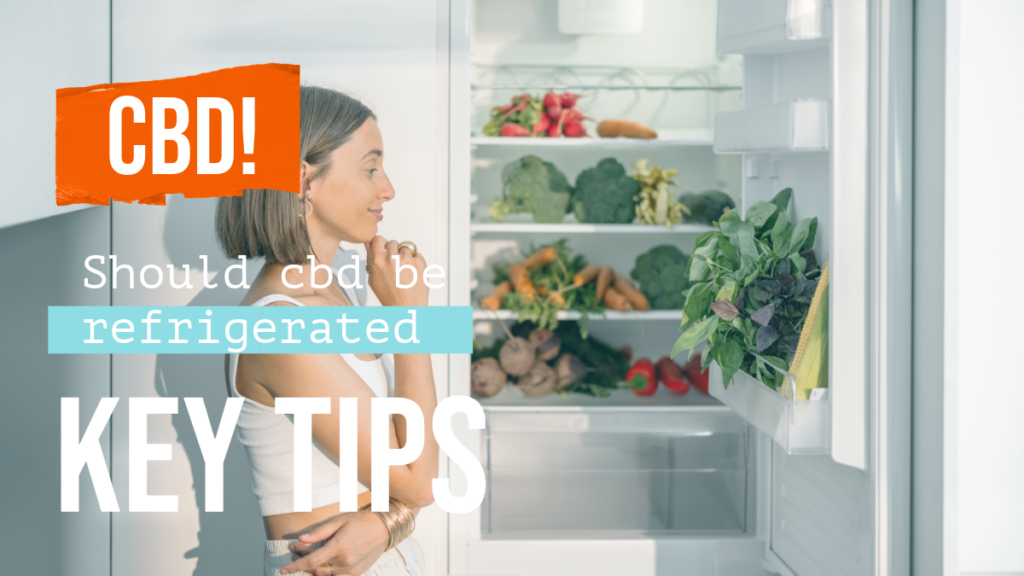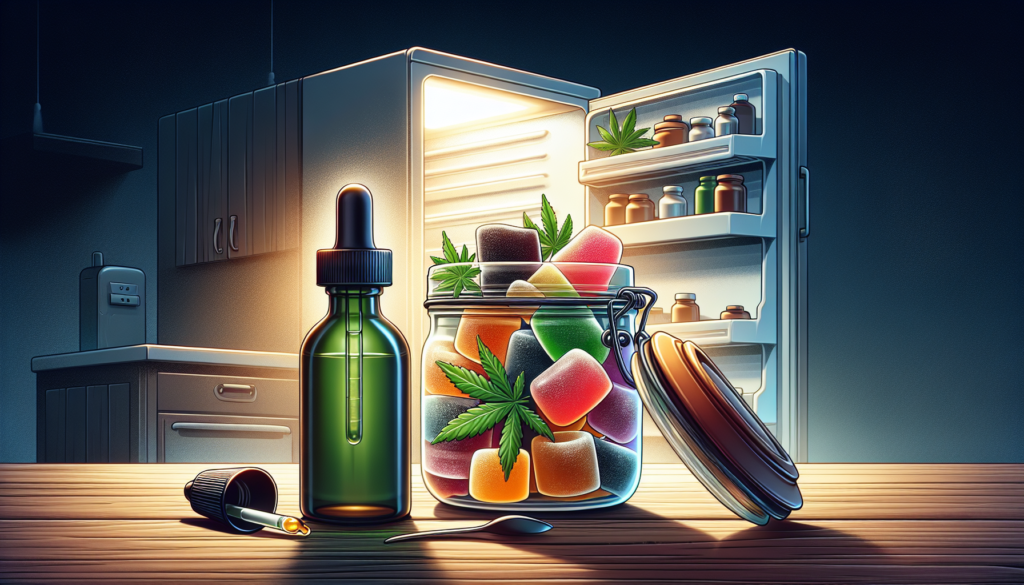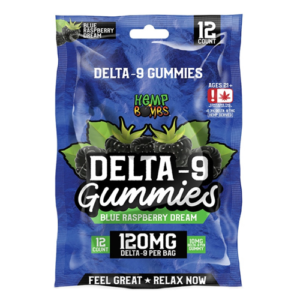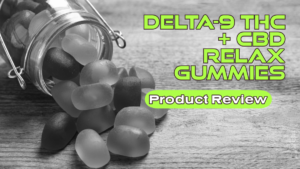CBD, a non-psychoactive compound found in the hemp plant, is celebrated for its varied health benefits, making the query “Should CBD gummies be refrigerated?” increasingly relevant for users aiming to maintain their potency. Proper storage is paramount in preserving the quality and effectiveness of CBD products, highlighting the importance of understanding how to keep these items at their best. The preservation of cannabidiol (CBD) and other cannabinoids is crucial for maintaining their therapeutic potential, ensuring that consumers continue to benefit from their use.
This article will delve into the nuances of CBD preservation, addressing whether CBD needs to be refrigerated and exploring the best practices for storing gummies, tinctures, and oils. By uncovering optimal storage suggestions and highlighting common storage mistakes to avoid, readers will acquire a comprehensive guide to extending the shelf life and effectiveness of their CBD products.

Understanding the Basics of CBD Preservation
Understanding the basics of CBD preservation starts with recognizing the various extraction methods and their influence on the final product’s shelf life. These methods include:
- CO2 Extraction: A method that uses pressurized carbon dioxide to pull CBD and other phytochemicals from the cannabis plant. This technique is known for producing high-quality CBD oil.
- Solvent-Based Extraction: Involves the use of solvents like alcohol to extract the cannabinoids. While effective, this method can leave residue if not properly purged.
- Carrier Oil Extraction: Utilizes carrier oils like olive or coconut oil to extract CBD, offering a more natural approach.
Post-extraction, the drying and curing processes are crucial for preserving CBD’s potency and preventing degradation:
- Drying: Essential for inhibiting microorganism growth by reducing the water activity level to between 0.55 and 0.65 aw. Common drying methods include air-drying, oven-drying, and freeze-drying.
- Curing: The final step in cannabis processing, which enhances the flavor profile of the plant and, by extension, the quality of CBD products derived from it.
For maintaining the quality and extending the shelf life of CBD products, proper storage is paramount:
- Storage Conditions: CBD oil should be kept in a cool, dry place away from direct sunlight to prevent breakdown of cannabinoids and terpenes. Exposure to high temperatures and light can significantly reduce its potency.
- Air Exposure: Limiting air exposure by keeping the bottle airtight is crucial as interaction with air can alter the chemical balance of CBD oil.
- Shelf Life Indicators: While the expiration date provides a general guideline, changes in color, smell, and taste can also signal degradation. Proper storage can extend CBD oil’s shelf life to one to two years.
By adhering to these guidelines, consumers can ensure that their CBD products retain their potency and efficacy for as long as possible[22].
Refrigeration and CBD Products
When considering the refrigeration of CBD products, it’s essential to differentiate between various types and their specific needs for optimal preservation:
- CBD Oil:
- General Storage: Typically, CBD oil does not require refrigeration under normal conditions and should be stored in a cool, dark place to maintain its potency.
- Refrigeration Benefits: For long-term storage or bulk purchases, refrigerating CBD oil can extend its shelf life up to a year. However, it’s important to note that refrigeration can cause the oil to thicken, making it difficult to dose. If the oil solidifies, allow it to return to a liquid state before use.
- Freezing: While freezing CBD oil is an option for very long-term storage, it can change the oil’s consistency and viscosity, making it harder to dispense. It’s advisable to store the oil in a freezer only if it’s airtight and to defrost it only once for use.
- CBD Edibles (Gummies, Capsules):
- Refrigeration: Refrigerating CBD edibles can help extend their shelf life, preserving their quality for a longer period.
- Other CBD Products (Topicals, Concentrates, Vape Cartridges, Flower, Pre-rolls):
- Storage Recommendations: These products do not necessarily need to be refrigerated. However, cold storage can benefit bulk purchases of topicals, concentrates, and vape cartridges. It’s crucial to avoid refrigerating CBD flower and pre-rolls as moisture can build up and negatively affect the product.
- Temperature Guidelines:
- Avoid High Temperatures: CBD oil and products should not be exposed to high temperatures, as this can degrade their potency. Keeping CBD products under 21°C is recommended, especially for oils. In hot climates, storing products in the refrigerator or freezer can help maintain their quality.
By adhering to these storage guidelines, users can ensure the longevity and consistent quality of their CBD products, maximizing their therapeutic benefits.

Optimal Storage Suggestions for CBD
To ensure the longevity and efficacy of CBD products, adhering to optimal storage suggestions is crucial. Here’s a breakdown of the best practices for storing different types of CBD products:
CBD Oils and Tinctures
- Location: Store in a cool, dark, and dry place away from direct sunlight and heat sources to prevent degradation of cannabinoids and terpenes.
- Temperature: Maintaining room temperature, ideally between 16°C to 21°C (60°F to 70°F), is sufficient for smaller quantities intended for short-term use. For optimal freshness and potency, keep temperatures between 12°C and 27°C.
- Container: Use an airtight container made of dark-colored glass to protect from oxygen and contaminants. Always ensure the container’s seal is tight to prevent air exposure.
CBD Edibles (Gummies, Capsules)
- Storage Method: Keep in airtight or vacuum-sealed containers to shield from air and moisture. This helps in preserving their quality for a longer period.
- Environment: Store at room temperature in a secure, lightproof container to prevent exposure to harmful light that can degrade cannabinoids.
General Tips for All CBD Products
- Humidity Control: Aim to keep CBD products at 58%-62% humidity to prevent mold and mildew growth, ensuring optimal freshness and potency.
- Monitoring: Regularly check the expiry date, taste, smell, and color of CBD oil for signs of degradation. Keep CBD products in their original packaging and label them to track purchase and expiry dates.
- Special Considerations: For unopened CBD oil, the shelf life is approximately 1-2 years, while opened CBD oil retains its quality for about 1 year. CBD Isolate should be utilized within 6 months for best results.
By following these storage guidelines, consumers can maximize the therapeutic benefits of their CBD products, ensuring they remain effective and safe for use.
Common Storage Mistakes to Avoid
To preserve the quality and potency of CBD products, avoiding common storage mistakes is crucial. Here are key practices to follow:
- Proper Placement:
- Always store CBD oil and products out of children’s and pets’ reach to prevent accidental ingestion and ensure safety.
- Avoid touching the dropper or pipette to your mouth or any surface to prevent contamination, which can degrade the product.
- Ideal Environment:
- Direct sunlight is detrimental to CBD products. The UV rays can break down cannabinoids and terpenes, reducing potency and effectiveness.
- Similarly, hot or humid environments can accelerate the degradation process. It’s essential to store CBD in cool, dry places to maintain its quality.
- Air and Moisture Exposure:
- Oxygen and moisture are enemies of CBD oil. An airtight container is necessary to limit exposure to air, which can alter the chemical composition of CBD, leading to premature breakdown.
- Signs of improper storage include unusual odor, color change, or a noticeable decrease in effectiveness. These signs indicate that the product may have been exposed to damaging conditions or has expired.
By adhering to these guidelines, consumers can avoid common pitfalls in CBD storage, ensuring their products remain potent and effective for as long as possible.
Conclusion
Throughout this exploration into the preservation of CBD products, including gummies, tinctures, and oils, we have highlighted the significance of proper storage to maintain potency and extend shelf life. By understanding the importance of cool, dry environments, minimizing air exposure, and considering refrigeration for certain products and situations, consumers can ensure that their CBD remains effective and safe for consumption. These practices not only safeguard the therapeutic potential of CBD but also prevent wastage, making them essential for anyone using or considering the use of CBD products.
The broader implications of these storage recommendations underscore the intricate relationship between cannabinoid stability and environmental factors. As users become more knowledgeable about how to care for their CBD products properly, the potential for achieving the maximum health benefits increases. This awareness also opens avenues for further research into cannabinoid preservation and the development of new storage solutions. Ultimately, by adhering to these guidelines, consumers can enhance their CBD experience, ensuring that the products they rely on for health and wellness retain their effectiveness over time.
References
Long – term Storage and Cannabis Oil Stability publication/236170001
Influence of Storage Conditions on the Chemical Potency of Herbal Cannabis 41023626



